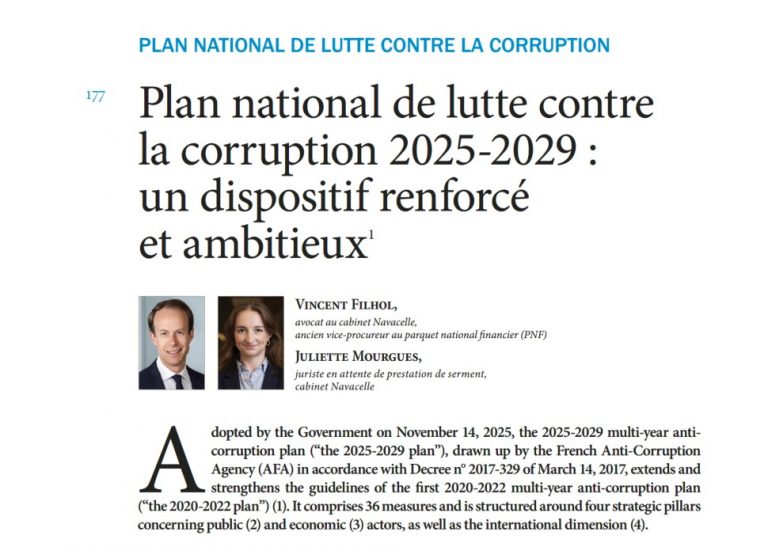While environmental law and the duty of vigilance appeared to be the legal topics expected to experience the most significant growth in litigation—leading, moreover, to the creation of Chamber 5-12 of the Paris Court of Appeal in January 2024—they have, in recent months, followed diverging paths. The duty of vigilance has encountered the issue of corporate competitiveness and its future has darkened following the announcement by the President of the Republic, Emmanuel Macron, on 19 May 2025, of its planned repeal. Conversely, repression is becoming increasingly effective in the area of criminal offences against the environment. Despite this, recent litigation concerning both environmental matters and the duty of vigilance shows how existing legal norms are being used to steer companies toward more socially and environmentally responsible practices.
A softening of European regulatory provisions and a political intention to repeal the duty of vigilance in the name of competitiveness
Corporate competitiveness has entered the European regulatory framework regarding their social and environmental responsibility. Thus, and in order to reduce the administrative burdens on companies while respecting the objective of carbon neutrality by 2050, the European Commission adopted a new set of legislative proposals known as the “omnibus” package, amending several European texts related to the implementation of the Green Deal and aiming to simplify the regulatory requirements imposed on companies.
A proposed postponement for CSSDs and CSRDs
It first put forward proposals to postpone the entry into force of the Corporate Sustainability Due Diligence Directive (CSDDD) by one year and the Corporate Sustainability Reporting Directive (CSRD) by two years, in order to give companies more time to comply with the new European requirements.
It also presented other legislative proposals aimed at easing the duty of vigilance, such as reducing its scope to direct business partners only, lowering the frequency of controls required from companies, or lightening the constraints applicable to the development of the value chain mapping.
The European Commission also proposes a significant reduction in the scope of application of the “CSRD” directive on sustainability reporting by large companies, in order to exempt 80% of companies currently covered by its application. The same applies to the Carbon Border Adjustment Mechanism (CBAM), which Brussels intends to exclude from application to “smaller importers”.
To date, the proposals for the postponement of the entry into force of the CSDDD and CSRD directives have been reviewed under the urgent procedure by the European Parliament and the Council, and were adopted respectively on 26 March and 14 April 2025. The legislative proposals relating to the simplification of environmental norms will be reviewed at a later stage, with no date announced as of yet.
These textual relaxations are not, for some, sufficient to satisfy the need to preserve the competitiveness of European companies, and the complete repeal of the “CSRD” directive has been mentioned by both the German Chancellor, Friedrich Merz, and the French President, Emmanuel Macron.
For more information on the issue:
- CSRD Directive: new sustainability reporting obligations
- New sustainability reporting obligations for French companies: what’s new?
A strengthening of the European regulatory framework regarding the enforcement of environmental offences
In a direction contrary to that taken regarding the duty of vigilance, the European Union has strengthened its regulatory arsenal applicable to environmental offences by adopting Directive 2024/1203 “on the protection of the environment through criminal law”, which must be transposed by Member States by 21 May 2026. This directive in fact constitutes a major overhaul of the former Directive 2008/99/EC, which had been considered incomplete and relatively ineffective due to the absence of a binding framework.
A European directive to be transposed by May 2026
To address this, the new directive first significantly broadens the scope of criminal liability for environmental offences:
- it defines 20 environmental offences, compared to only 9 currently
- it introduces so-called “standalone” offences
- it establishes “qualified” offences, which constitute particularly serious environmental harm
- it also sets penalty thresholds, including fines for legal persons and imprisonment for natural persons, applicable to environmental offences.
These elements imply, on the part of Member States, a certain revision of their national legislation on environmental harm. It should be noted, however, that the text sets relatively flexible criteria, allowing them, if they so choose, to adopt a more stringent regulatory framework.
National litigation on environmental law and the duty of vigilance is booming
Dispute resolution concerning the duty of vigilance is experiencing a certain increase, as illustrated by the various decisions rendered by the courts in this field.
An unprecedented use of mediation heralds a change in practice
Considering that the absence of a clear “de-plastification” strategy in Danone’s vigilance plan constituted a breach of its duty of vigilance, Client Earth, Surfrider Foundation Europe and Zero Waste France issued a formal notice to the company before the Paris Judicial Court in January 2023. However, in an unprecedented decision, the court ordered mediation, which ultimately resulted in a settlement agreement concluded on 17 February 2025. Danone and the three NGOs announced that they had reached an agreement ending the dispute, under which the company committed to four actions, including strengthening its risk mitigation and prevention policy concerning plastic use, and holding annual meetings with the NGO coalition over three years. The unprecedented nature of this amicable resolution procedure paves the way for a shift in litigation practices in this area.
For more information on the issue: Danone sued for breach of its duty of vigilance: mediation initiated
On 13 February 2025, the chamber of the Paris Judicial Court specialised in the duty of vigilance rendered a decision dismissing the claims brought by the unions Fédération Transports et Environnement and Union Fédérale Cheminot against SNCF. The unions had requested that the Court order SNCF to update its vigilance plan, notably its mapping of social and environmental risks. The Judicial Court rejected the request, explaining in particular that the unions had failed to clearly and concretely identify “the risks and serious harm to be prevented to the environment, health, or safety of individuals with respect to SNCF’s vigilance plan risk mapping”.
More recently, on 17 June 2025, Chamber 5-12 of the Paris Court of Appeal, specialised in matters relating to the duty of vigilance, confirmed the judgment of the Paris Judicial Court dated 5 December 2023, which had ordered La Poste to substantially revise its vigilance plan, making La Poste the first French company to be sanctioned under the duty of vigilance law of 27 March 2017. The Court of Appeal reaffirmed the importance of risk mapping for the identification, analysis, and prioritisation of risks required to later determine actions aimed at preventing serious harm to human rights and fundamental freedoms. It held that in this case, the vigilance plan’s risk mapping implemented by La Poste did not meet this objective due to its overly general nature. The Court also emphasised the need for genuine consultation with representative trade unions regarding the establishment of the alert and whistleblowing mechanism, noting that La Poste had not provided evidence of such consultation.
Eleven environmental CJIPs, with increasing fines
Alongside this litigation relating to the duty of vigilance, judicial proceedings concerning environmental offences are also active, as demonstrated by the eleven environmental CJIPs concluded over the past twelve months. Non-specialised public prosecutors are increasingly making use of this tool in implementing their environmental criminal policy, proposing increasingly significant fines – as illustrated by the record €2 million fine set in the environmental CJIP concluded between the Epinal Public Prosecutor’s Office and SAS Nestlé Waters Supply Est (NWSE) on 12 September 2024.
For more information on the issue:
- The challenges of environmental criminal law in light of the CJIP on environmental matters
- An environmental CJIP: towards a greener negotiated justice
- Judicial public interest agreements – Key to understanding French DPA










